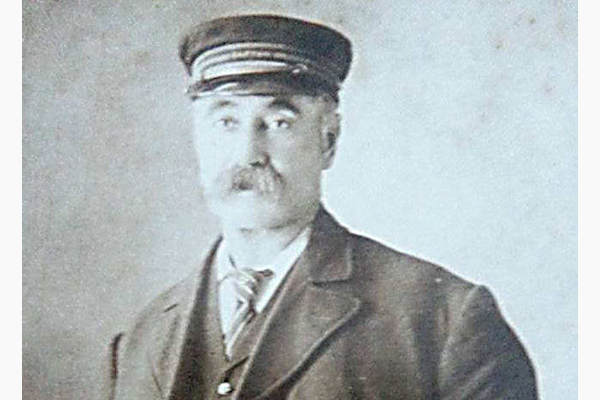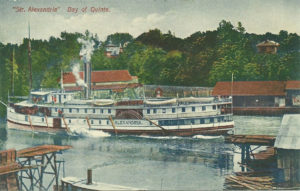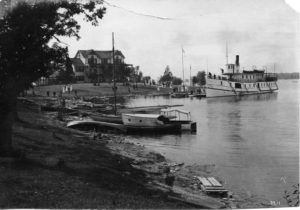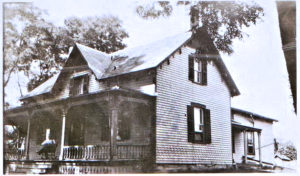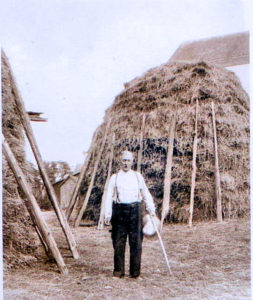Captain Bill stood as a venturesome mariner in the golden era of sail and steam. Known familiarly as Captain Bill or Billy, his full name was William Elias VanVlack. His tenure encompassed the command of various sizable schooners and steamers navigating the waters of Eastern Lake Ontario. While the remuneration was attractive, Captain Bill harboured aspirations beyond the helm.
As he traversed the treacherous waters known as the "graveyard of Lake Ontario," he carried the weight of sailing's perils on his shoulders. This menacing stretch east of Prince Edward County had claimed the lives of countless sailors upon its rocky shoals. Captain Bill remained acutely aware that his fortune might one day wane, thus prompting a resolution to acquire a coal yard and retire from his seafaring career.
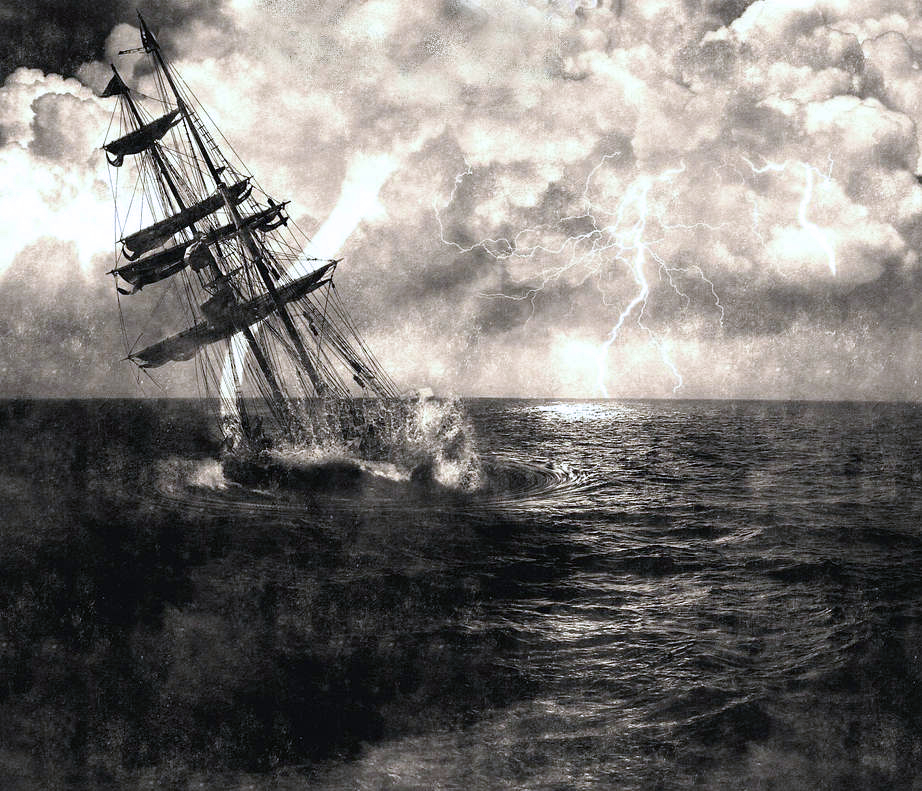
To build the financial foundation for this aspiration, Captain Bill ventured into ship investments. However, this path proved to be nearly as precarious as captaining vessels himself. His initial foray led him to become a partner in the schooner Eliza Quinlan. In an early winter gale of 1882, misfortune struck as Eliza Quinlan was thrust onto the rocks near Point Traverse's Poplar Point. Captain Bill and his crew narrowly escaped the clutches of death, thanks to the Point Traverse lifesaving crew. Unfortunately, the ship faced a less fortunate fate, shattered by the relentless fury of the waves.
Yet, this setback only fanned the flames of Captain Bill's determination. Instead of quelling his ambition, it fueled his drive to expedite his retirement from the sailor's life. He proceeded to acquire interests in schooners W.J. Suffel and Cleopatra, as well as the steamer Varuna. Throughout his career, he commanded steamers like Alexandria, the Empress of India, Enterprise, Greyhound, C.H. Merritt, D.R. Van Allen, and the schooners Cleopatra and Eliza Quinlan.
His involvement with the W.J. Suffel brought its own set of challenges. The following tale is based on a story by Alex Taylor of Picton while sailing on the Great Lakes.
This Suffel – there being three of them, and this was the middle one, the W.J. – was getting on in years. She had been a good ship, but had been laid up for a while. Capt. Wm. VanVlack of Toronto – everybody liked Billy and called him that – had taken the plunge and bought her at a bargain, as he thought. Thus, after years of struggle with the lakes, he became an owner. He didn't let it go to his head. He remained master of the steam barge D. R. Van Allen, at a good wage, and got Capt. Steve Taylor to sail his property.
Full of zeal, Steven brought the W.J. Suffel into Fairhaven, N.Y. for her first load. He told the DL & W office to pour 500 tons of anthracite into her, pronto. An hour later he was back, crestfallen. He found that the vessel was not insured, because the inspector found that it needed repairs. Billy knew nothing about it. The load of coal had been assigned to him, so if the load didn't arrive in Toronto he would be "barefoot at fifty." (broke)
So the crew set out for Toronto, hoping for the best. Next morning, in midlake, they found that there was a leak that the pumps could not keep up with. A few inches more and down she would go. "Boys" puffed Steve, under his breath so his daughter Jessie (the cook) wouldn't hear, "I hate to do this, for everything Billy VanVlack has in the world is right under our feet. But, we've got to leave her, if we're going to keep our caps dry".
"What are you doing, dad?" asked Jessie, as they readied the yawl. "We're leaving her, Jessie," Steve almost sobbed. "We're ruining Billy Van Vlack but we can't keep her afloat. We may be in the yawl a long time Jessie, and, you know -- hadn't you better go to the toilet, before you get into the boat?"
The Suffel was a well-found lake schooner, with a toilet for the cabin (most vessels used "outside plumbing".) When Jessie returned, she remarked that it sounded like a city hydrant bursting in the toilet. She had accidentally discovered the leak that was caused by a corroded discharge pipe from the toilet. The crewman Alexander Taylor worked underwater in the dark to stop up the leak with a wad of tarred waste and sailmaker’s fid (rope splicing tool). If the ship had sunk, it would have carried him a hundred fathoms down to the bottom of the lake. The pumpers started gaining on the leak and they limped the Suffel along for twelve hours until the lights from Gibraltar Point were spotted. Everyone was exhausted from the continuous pumping. If the wind had come up, it would have blown the Suffel over, with all that water in her.
Billy VanVlack met them with Joe Goodwin's little tug Nellie Bly. He had sold the coal cargo by telephone, the hour the Suffel was sighted. They towed her to the Burns dock. He paid the crew a bonus and instructed Steve to get all the work done that was needed to re-class her for insurance. "This trip'll pay for it all. No, don't lay the boys off. Keep 'em on full time till she's ready to sail again, and then sign 'em fresh. And double whatever you're paying Jessie."
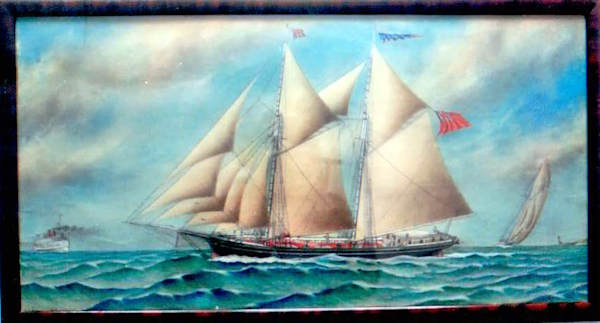
The painting of the schooner W.J. Suffel, commissioned by Captain Bill, has been passed down through generations, now resting with his great-grandson (my husband, also named Bill VanVlack).
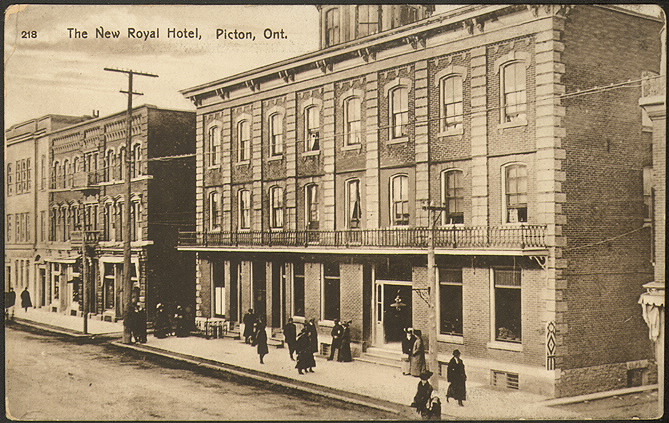
Though a coal yard remained an unrealized dream, Captain Bill shifted his focus closer to his familial roots in Picton, eventually partnering in the Royal Hotel. In 1912, he bade adieu to his sailing days and acquired a lakeside farm in Cressy, sharing it with his son Muir.
Photographs show Bill relaxing on the farm's veranda, overlooking Lake Ontario—a refuge from sailing's perils. His daring maritime journey ultimately yielded the safety of a farmer's life. Thus, Captain Bill transformed into Farmer Bill, a testament to perseverance and a risk-taker's legacy.
This article was featured in County Magazine Spring 2021 issue.

